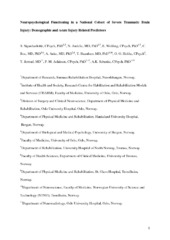| dc.contributor.author | Sigurdardottir, Solrun | |
| dc.contributor.author | Andelic, Nada | |
| dc.contributor.author | Wehling, Eike | |
| dc.contributor.author | Røe, Cecilie | |
| dc.contributor.author | Anke, Audny | |
| dc.contributor.author | Skandsen, Toril | |
| dc.contributor.author | Holthe, Øyvor | |
| dc.contributor.author | Jerstad, Tone | |
| dc.contributor.author | Aslaksen, Per Matti | |
| dc.contributor.author | Schanke, Anne-Kristine | |
| dc.date.accessioned | 2018-03-20T14:39:06Z | |
| dc.date.available | 2018-03-20T14:39:06Z | |
| dc.date.issued | 2015 | |
| dc.Published | Sigurdardottir S, Andelic N, Wehling EI, Røe C, Anke A, Skandsen T, Holthe Ø, Jerstad T, Aslaksen PM, Schanke A. Neuropsychological functioning in a national cohort of severe traumatic brain injury: demographic and acute injury-related predictors. The journal of head trauma rehabilitation. 2015;30(2):E1-E12 | eng |
| dc.identifier.issn | 1550-509X | |
| dc.identifier.issn | 0885-9701 | |
| dc.identifier.uri | https://hdl.handle.net/1956/17537 | |
| dc.description.abstract | Objectives: To determine the rates of cognitive impairment 1 year after severe traumatic brain injury (TBI) and to examine the influence of demographic, injury severity, rehabilitation, and subacute functional outcomes on cognitive outcomes 1 year after severe TBI. Setting: National multicenter cohort study over 2 years. Participants: Patients (N = 105), aged 16 years or older, with Glasgow Coma Scale score of 3 to 8 and Galveston Orientation and Amnesia Test score of more than 75. Main Measures : Neuropsychological tests representing cognitive domains of Executive Functions, Processing Speed, and Memory. Injury severity included Rotterdam computed tomography score, Glasgow Coma Scale score, and posttraumatic amnesia (PTA) duration, together with length of rehabilitation and Glasgow Outcome Scale–Extended score. Results: In total, 67% of patients with severe TBI had cognitive impairment. Executive Functions, Processing Speed, and Memory were impaired in 41%, 58%, and 57% of patients, respectively. Using multiple regression analysis, Processing Speed was significantly related to PTA duration, Glasgow Outcome Scale–Extended score, and length of inpatient rehabilitation (R 2 = 0.30); Memory was significantly related to Glasgow Outcome Scale–Extended score (R 2 = 0.15); and Executive Functions to PTA duration (R 2 = 0.10). Rotterdam computed tomography and Glasgow Coma Scale scores were not associated with cognitive functioning at 1 year postinjury. Conclusion: Findings highlight cognitive consequences of severe TBI, with nearly two-thirds of patients showing cognitive impairments in at least 1 of 3 cognitive domains. Regarding injury severity predictors, only PTA duration was related to cognitive functioning. | en_US |
| dc.language.iso | eng | eng |
| dc.publisher | Wolters Kluwer | eng |
| dc.title | Neuropsychological functioning in a national cohort of severe traumatic brain injury: demographic and acute injury-related predictors | eng |
| dc.type | Peer reviewed | |
| dc.type | Journal article | |
| dc.date.updated | 2018-01-14T09:24:45Z | |
| dc.description.version | acceptedVersion | |
| dc.rights.holder | Copyright 2015 Wolters Kluwer Health, Inc. All rights reserved. | eng |
| dc.identifier.doi | https://doi.org/10.1097/htr.0000000000000039 | |
| dc.identifier.cristin | 1127752 | |
| dc.source.journal | The journal of head trauma rehabilitation | |
| dc.relation.project | Norges forskningsråd: 209748 | |
| dc.relation.project | Helseforetak: Sunnaas sykehus HF | |
| dc.subject.nsi | VDP::Medisinske fag: 700::Klinisk medisinske fag: 750::Fysikalsk medisin og rehabilitering: 764 | |
| dc.subject.nsi | VDP::Midical sciences: 700::Clinical medical sciences: 750::Physical medicine and rehabilitation: 764 | |
| dc.subject.nsi | VDP::Medisinske fag: 700::Klinisk medisinske fag: 750::Traumatologi: 783 | |
| dc.subject.nsi | VDP::Midical sciences: 700::Clinical medical sciences: 750::Traumatology: 783 | |
